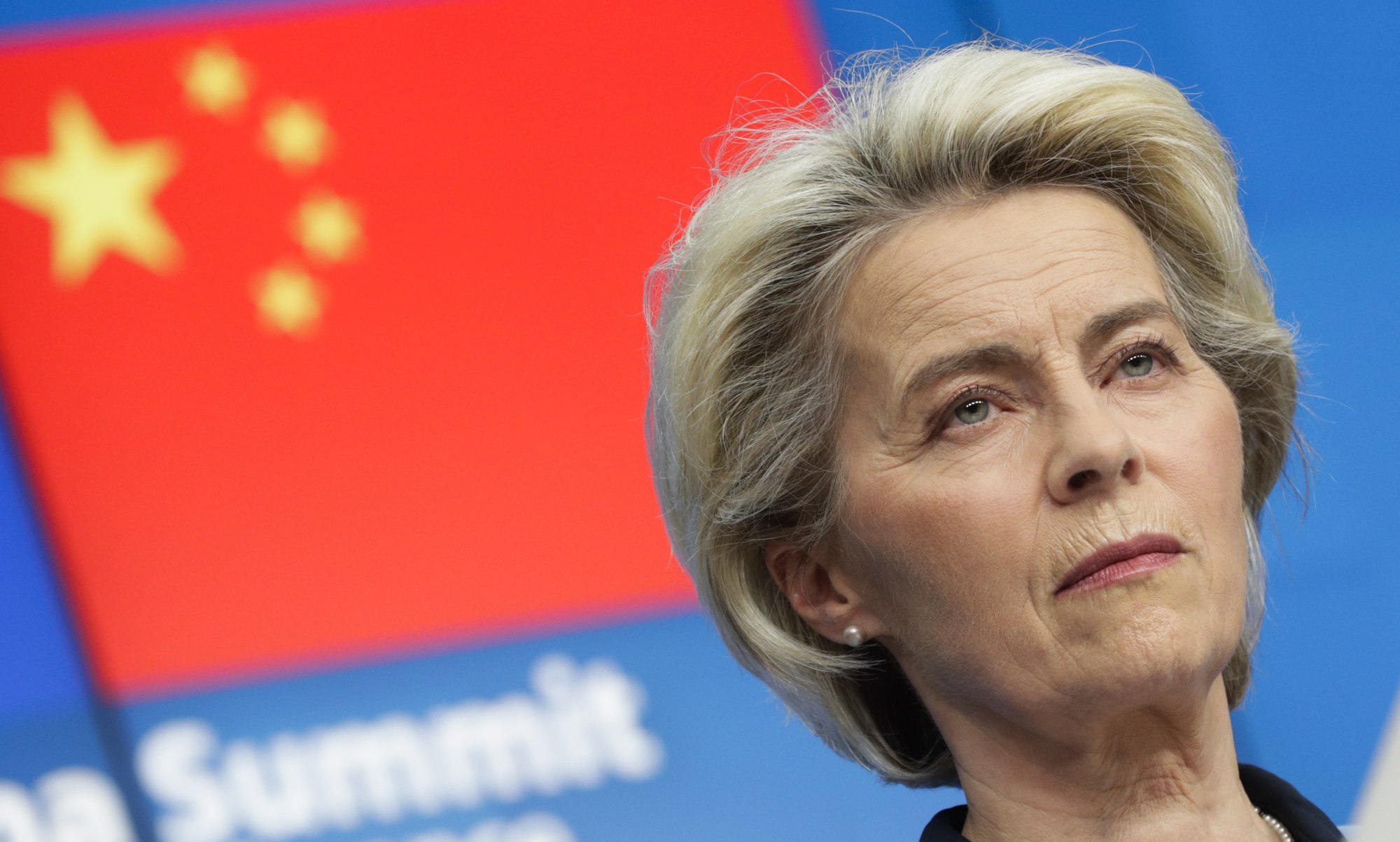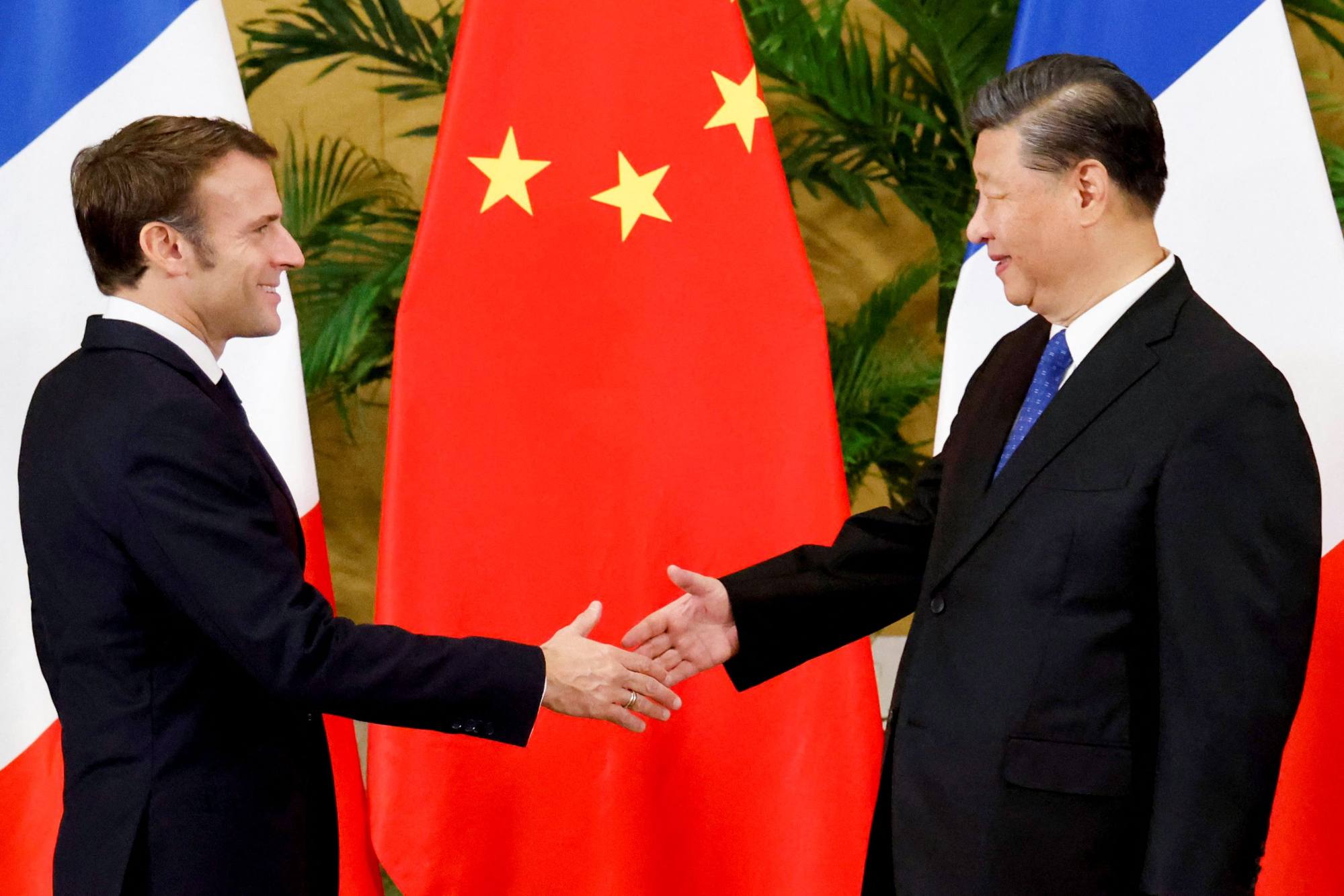
In Beijing trip, European leaders’ unity on China will be put to the test
- French President Emmanuel Macron and European Commission chief Ursula von der Leyen will arrive in Beijing on Wednesday
- They will meet with Chinese President Xi Jinping, but Macron, hoping to firm economic ties, is less hawkish than von der Leyen
It has been billed as a display of European unity.
But when French President Emmanuel Macron and European Commission chief Ursula von der Leyen touch down in Beijing on Wednesday, many will be looking for signs of just how far apart they are on China policy.
Macron invited von der Leyen to show that they come “not as disunited states, but as bearers of a European position”, according to a senior French government official.
In the run-up to the visit, however, the commission president took her place among the continent’s toughest talkers on China. Her speech in Brussels last week was seen as an attempt to bolster the European Union’s approach both politically and economically.

By contrast, Macron has enjoyed warm ties with Chinese President Xi Jinping through the years. On his last state visit to Beijing in 2018, he gave Xi an eight-year-old gelding named Vesuvius, one of the very top picks from the presidential cavalry corps.
The Frenchman bristles at the idea of taking a hardline approach akin to the United States’ policy. The strongest proponent of a sovereign European Union, Macron sees a three-day state visit as a chance to reestablish France and Europe as a “third way” somewhere between the US and China.
Élysée sources do not expect Macron to give Xi a tough grilling during six to seven hours of talks in various locations.
“It is necessary to reconnect with China … to give a horizon and emerge from this period of volatility that has been the three years of zero-Covid policy in China,” one official said.
China unlikely to be swayed on Ukraine but EU talks may be ‘starting point’
Macron will press Chinese leaders to help end Russia’s 13-month invasion of Ukraine – but not too hard.
“China is one of the few countries in the world – if not the only one – to have a game-changing effect on the conflict, in either direction,” the official added.
“So the president will go to China not to question Chinese red lines, in particular the refusal to condemn Russia, but to find a space to be able to carry initiatives that will benefit the Ukrainian population, then create a way to identify a solution to this war in the medium term.”
Macron also plans to sign business and cultural deals to bring France and China closer together. Despite years of slow progress, he is determined to crack open the Chinese market for French firms.

Joining him on the trip will be up to 60 French executives, including Airbus, L’Oreal, EDF and Veolia representatives. Figures from the arts will also travel with Macron, including the electronic music innovator Jean-Michel Jarre and the film director Jean-Jacques Annaud, whose Notre-Dame on Fire will open in Chinese cinemas in the coming days.
The delegation even includes the head of the ZooParc de Beauval, home to the only giant pandas in France.
While sensitive issues like human rights and Taiwan will be discussed, they are not expected to form the main thrust of Macron’s multiple meetings with Xi – one of which will be taken alongside von der Leyen.
“Our position on Taiwan has not changed. It will be up to the Chinese authorities to see if they wish to raise this subject,” the official said.
Instead, Macron values the opportunity to reconnect with Xi, whom he last met with briefly at the G20 summit in Indonesia in November. With this in mind, he will have at least one meeting with Xi in Guangdong province – in part because of its importance as an export powerhouse, but also due to Xi’s family connections there.
China has now turned the page on the era of ‘reform and opening’ and is moving into a new era of security and control
“There is a direct link with President Xi because his father was the head of the province in the 1980s and launched the opening reforms,” the official explained.
“Even Xi Jinping’s wife has sung several times in the Cantonese operas, which are very well known in China. These are the reasons we’re going to Guangdong.”
Some believe that Macron’s itinerary clashes with the vision of EU-China relations von der Leyen laid out in her speech last week at the European Policy Centre in Brussels, in which she seemed to dismiss suggestions that China would continue to open its economy to European firms.
EU slams China for siding with ‘aggressor’ in Ukraine war
“China has now turned the page on the era of ‘reform and opening’ and is moving into a new era of security and control,” she said. Von der Leyen will hold private meetings with Xi as well as with Premier Li Qiang in Beijing.
She also played down hopes that China would help broker peace in Ukraine, saying that Beijing was trying to redraw the global order with itself at the centre.
“Far from being put off by the atrocious and illegal invasion of Ukraine, President Xi is maintaining his ‘no-limits friendship’ with [Russian president Vladimir] Putin,” she said.
The speech landed well in Brussels, where it was viewed as an effort to put some meat on the bones of the 2019 strategy of viewing China simultaneously as a partner, competitor and rival.
Von der Leyen’s cabinet consulted closely with officials from Australia, India and Japan in writing the speech. The US was not thought to have been directly involved.
After a year in which Europe’s reliance on Russian energy was badly exposed, von der Leyen wanted to ensure that history did not repeat itself with China.
Several senior officials viewed the speech as a bid to ask EU member states for a lot, in the hope that they would move a little in her direction.
But some have also speculated that it puts von der Leyen on a collision course with both France and Germany, which are less interested in shaking ties with the world’s second-largest economy.
At a lunch meeting in Paris on Monday, however, von der Leyen and Macron were said to be on the same page concerning EU-China policy, even if the French leader prefers not to use the same “de-risking” language.
EU plans new steps to combat threats from Chinese tech, official says
But it remains to be seen if France and Germany – the EU’s two most influential members – will be fully on board with a new economic security strategy, which the commission plans to deliver by June, that is expected to look to stop European companies from investing in sensitive sectors in China.
One senior official, speaking on condition of anonymity, described the commission’s new outlook as “more China-last than Europe-first”.
Philippe le Corre, a senior fellow at the Asia Society Policy Institute, said that Macron and German Chancellor Olaf Scholz agree that “economic decoupling with China is a dangerous and self-harming proposition for the EU, [that] Europeans should not emulate the United States’ hawkish approach”.

The speech also provoked criticism from the Chinese government. Beijing’s ambassador to the EU, Fu Cong, said it exposed “deep-seated ambivalence” in the commission.
“On the one side she realises that it is important for Europe … to engage with China, and at the same time, she is fearful of criticism … from hardliners in Europe and maybe even from the US,” he told Chinese broadcaster CGTN.
All eyes, then, will be on where exactly the pair land during their trilateral meeting with Xi on Thursday.
“It is important to ensure that this is a long-term display of unity,” said Antoine Bondaz, a China specialist at La Fondation pour la Recherche Stratégique, a French think tank.
“To play good cop-bad cop with von der Leyen in China would be self-defeating, because it would run counter that display of unity.”

